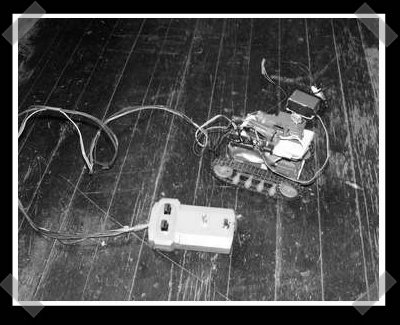
[Adam] sent in his robot: Ard-e. It’s build on a cheap remote control bull dozer kit along with a pile of cheap parts. He managed to keep the cost under $100. You might be getting sick of the Arduino love, but we love how the platform makes it possible for the micro controller novice to get results without taking advanced assembly language.
5 thoughts on “Ard-e: Cheap Arduino Robot Platform”
Leave a Reply
Please be kind and respectful to help make the comments section excellent. (Comment Policy)















Cool cheap hack… I love the cheaper hacks!!
Speaking of the Arduino… Can we get a hacks column on the right for all the projects that use the Arduino?
I know there seem to be a fair amount of them lately.
Nothing against Arduino love, but how about some other platforms? The Basic stamp has been around for ever, and there’s many platforms available with a free C compiler (i.e. most of the pics, msp430). A lot of these have an evaluation kit for $50 or less, and many you can build yourself with a handful of parts.
Even an occasional Lego Mindstorm hack would be cool.
Besides, I recommend learning at least some assembly language on a micro controller to ANY programmer. It gives you a real appreciation of just how much easier things are with a higher level language, and it teaches you to write tighter code.
I went with the Arduino for Ard-e because I have no experience at all with programming. The tutorials and sample codes found online made it possible for me to accomplish this project. Eventually i’ll move onto more advanced micro controllers as the projects i attempt get harder but the Arduino is perfect as an intro.
Not that I’m dissing the arduino but but I never got into them because I use real AVRs the arduino is like a basic stamp for avrs instead of pics it’s very popular because it’s open but almost every project I see using an arduino could be done cheaper using an avr. an atmel atmega168 can run anything an arduino can because that’s what an arduino is. the c compiler is free and open and the usb programmer was about $23 so I guess I always saw the arduino as kind of gimicky.
I recently bought an Arduino to test out some code for my customers. I actually find it pretty useful; what it boils down to is an ATmega with easy-access headers and a bootloader that works with an onboard USB converter. Instead of a snarl of cables and programmers and breadboards, I can do AVR development with a single board plugged into a laptop USB port. I’d say the convenience is worth the $33. And the software is just a fancy wrapper for GCC, everything compiles to native code and runs quickly. This means you can actually get 12 MIPS instead of a few KHz like the Stamp.
Naturally, I use a plain ATmega or ATTiny in a final, single purpose project. But the Arduino is a painless way to test out some concepts without shuffling cables around each time you download some new code.